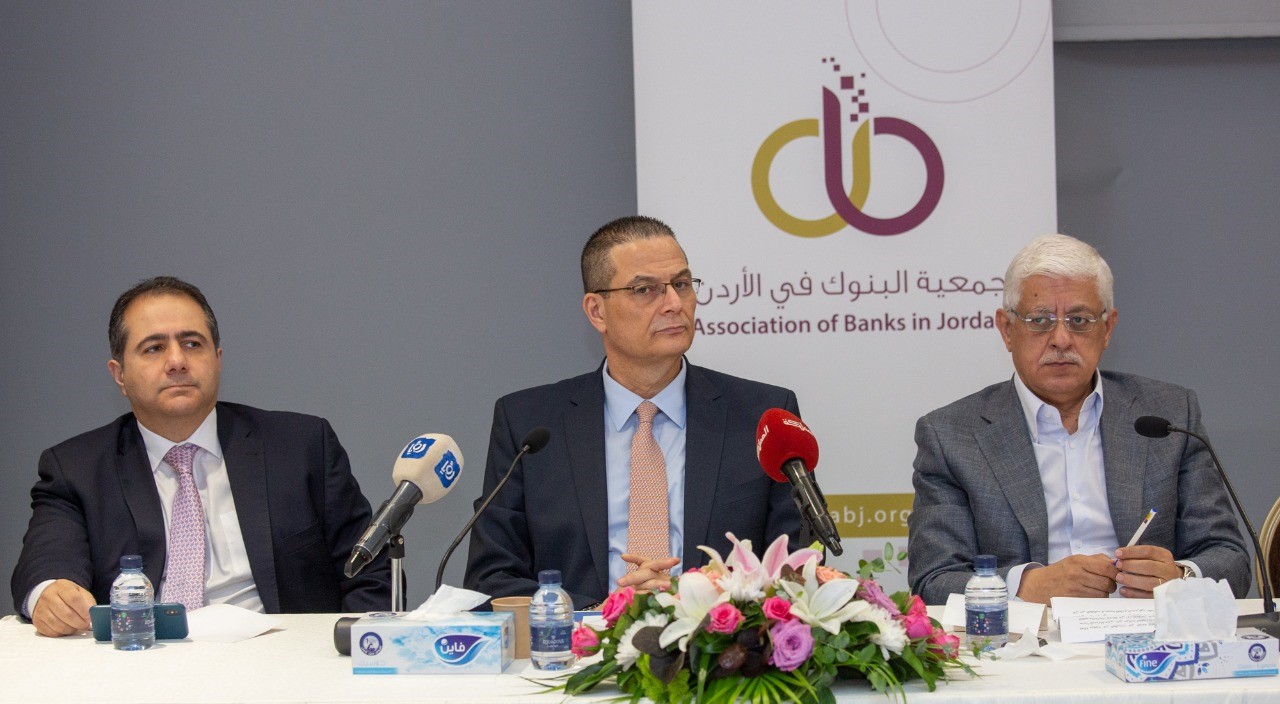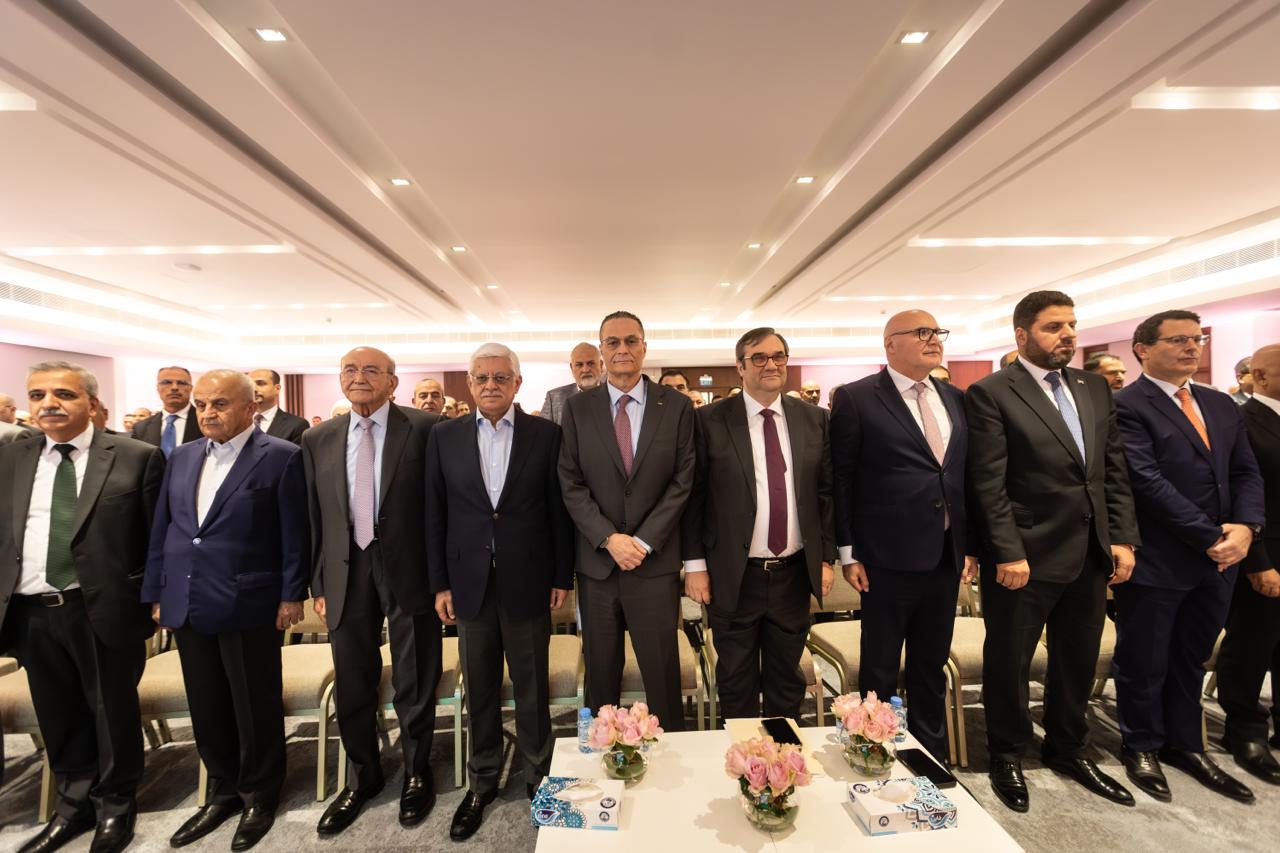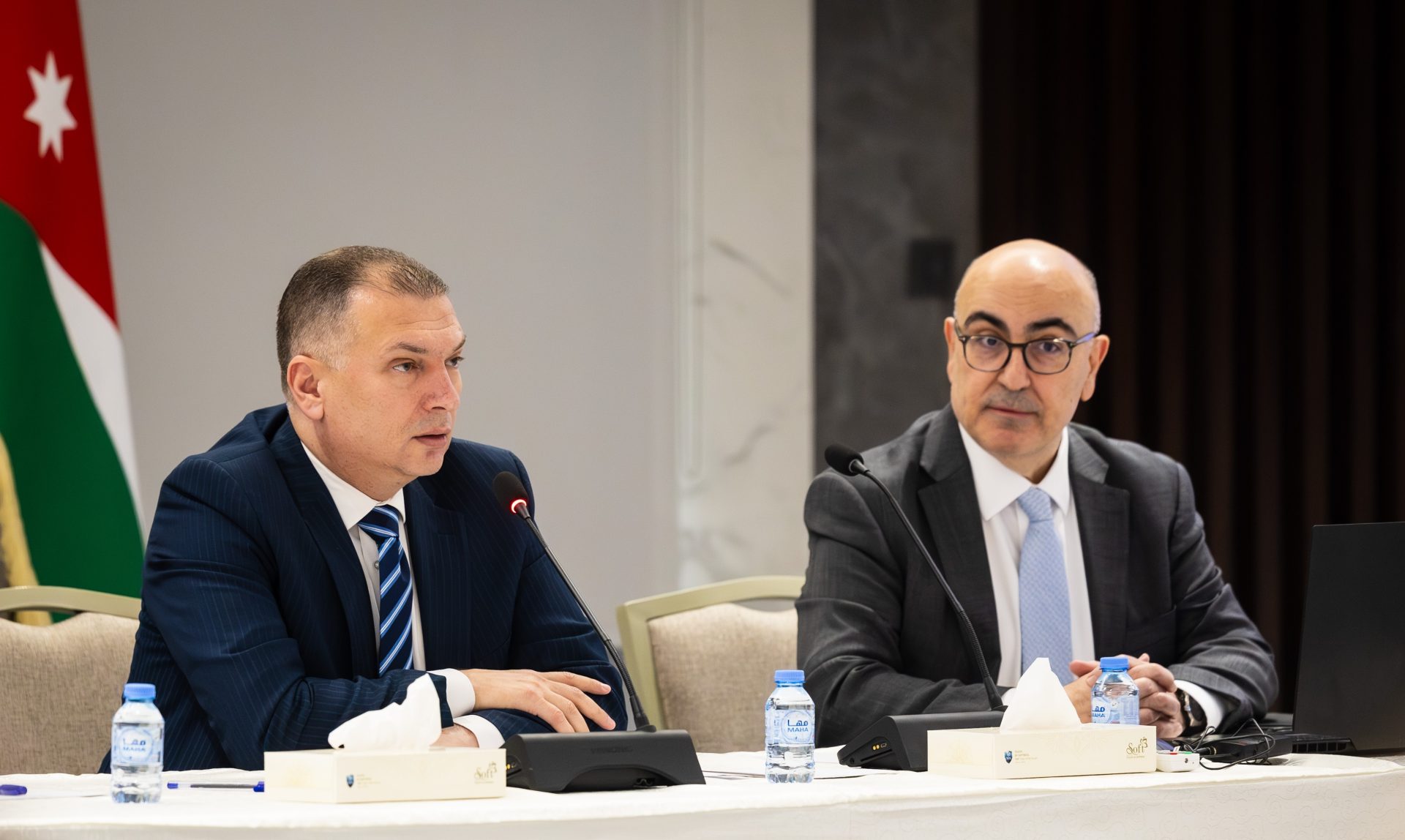
Sharkas: The vision of economic modernization is a major focus within the comprehensive reform package that His Majesty the King directed to implement.
Al-Salem: The workshop came to discuss the economic modernization vision and to review the role of the financial sector in particular.
Al-Mahrouq: The financial markets and services sector presented more than 30 priorities represented in 12 initiatives that reflect the aspirations of the financial sectors.
Karadsheh: The document will be translated into a clear and participatory action plan that focuses on value-added economic growth that provides good jobs.
Abu-Ghazaleh: The economic vision includes 8 drivers that drive economic growth including all economic sectors in the Kingdom.
ABJ held a dialogue session, Thursday morning, to discuss the role of the markets and financial services sector in the vision of economic modernization and how to unlock the potential to build the future in the presence of the Governor of the Central Bank, Dr. Al-Salem, and Dr. Tariq Abu Ghazaleh, one of the advisors for preparing the vision, and a number of heads of bank boards in addition to representatives of other financial sectors.
Dr. Sharkas confirmed that the financial sectors participated extensively in discussing the preparation of the economic vision document, during the economic workshop held by the Royal Court, stressing that the vision of economic modernization comes as a major axis within the comprehensive reform group that His Majesty King Abdullah II Ibn Al Hussein called for its implementation.
He pointed out that the goal of the document is to raise economic growth in partnership between the public and private sectors which will be reflected in improving the living conditions of citizens and creating more job opportunities.
He pointed out to the importance of holding this session to focus on the role of the banking sector in the vision stressing the need for unifying the efforts of the financial sectors to achieve the vision’s goals.
In turn, Mr. Al-Salem said, this session came to discuss the vision of economic modernization and to see the role of the financial sectors in particular.
Al-Salem explained that the new vision was launched based on three main pillars of the financial sector; to ensure continuous economic growth in terms of financing for sustainability and financing for all as a means to enhancing financial inclusion, and financing for growth in order to develop infrastructure and the business environment in addition to the role of the financial sector in leading the digital transformation process in other sectors due to its provision of financial services in an innovative and approved manner based on technology.
Mr. Al-Salem said that the banking sector is progressing at a steady pace that is reflected in improving the standard of life of citizens through its deep role in the economy and advancing the development wheel by financing programs and projects it provides and participates in addition to providing financial technology services that will improve the level of services.
Mr. Al-Salem stressed that the financial and banking sector in Jordan is solid and represents twice the GDP which gives it the advantage of attractive local and foreign investment while the sector will work in partnership to support stimulating initiatives for other sectors especially financing SMEs as its share of the facilities exceed 10% of the total, thus, stimulating the employment policy in general.
For his part, Director General of ABJ, Dr. Maher Al-Mahrouq, said that the financial markets and services sector provided more than 30 priorities represented in 12 initiatives that reflect the aspirations of the financial sectors.
He said that the mechanism for the work of the markets and services sector took place in 4 phases which consisted of discussing the current situation of the sectors in Jordan, setting the ten-year vision and the growth priorities of the sub-sectors, enabling factors and then coming up with an implementation map.
Regarding the summary of the results of the matrix of enablers, Dr. Al-Mahrouq pointed out that the financial markets and services sector provided more than 30 priorities represented by 12 initiatives in financial services. The results were limited to 6 enablers that reflect the directions and aspirations of the sub-sectors, normally, banking sector, capital market, insurance, financial leasing, microfinance and financial technologies.
He pointed out that the markets and financial services sector presented more than 30 priorities represented by 12 initiatives during the economic workshop, and the sector relied, in its discussion and dialogue sessions, on a clear work mechanism to come up with the initiatives as they were reflected in a short and medium-term time matrix.
Dr. Al-Mahrouq stressed that the Jordanian financial sector has strong potentials as one of the engines of development and growth in the national economy in general and the economic sectors individually, thus enhancing the possibility of achieving the goals desired by His Majesty King Abdullah II in creating job opportunities, expanding the middle class, and providing a better life for Jordanians.
Dr. Al-Mahrouq pointed out that the financial sector, especially the banking sector, has a number of strengths that support the new economic trend as it is the intermediary that overlaps with other sectors such as industry, trade, tourism and technology in addition to its primary role in terms of savings, providing financing and the comprehensiveness of the service it provides.
During the dialogue workshop, Al-Mahrouq reviewed a number of key points for the role of the markets and financial services sector in the vision of economic modernization noting that the sector includes 7 sub-sectors, namely banks, insurance, capital market, financial leasing, microfinance, financial technology, banking and money transfer which gives it a great advantage in the future economic movement in general.
Dr. Al-Mahrouq mentioned that the banking sector is working on developing new financing tools that will contribute to boosting economic growth in the future especially capital financing tools in terms of providing and activating Islamic financing bonds and instruments through the financial market as well as preparing for launching sustainable green financing tools that take into account environmental needs to achieve the transition to a green economy.
In turn, Mr. Karadsheh said that the national economy faced many challenges as a result of external factors noting that economic work in the past years did not meet ambitions and relied in some cases on diligence. These matters were bypassed in the vision methodology as it relied on taking lessons from previous plans.
Karadsheh stressed that this vision will be reflected in a clear and participatory action plan focusing on value-added economic growth that provides good jobs. On translating the vision into projects. He said that the vision needs 11 billion dinars over the next ten years as a government investment stressing that the implementation of projects and work mechanisms have been discussed with the government in a strong manner. The vision needs 41.4 billion dinars most of which will be of investment and partnership projects between the two sectors.
He pointed out that the government will work in the coming period to enable growth and advance the economic environment announcing that during the next two weeks an investment map for the Kingdom will be issued.
He pointed to the economic vision that was prepared in partnership between the public and private sectors, the presence of the media, members of the House of Representatives and the Senate in addition to experts from several sectors indicating that 500 people participated in the two-stage workshop.
He noted that the participants are of opinion and experience considering that this is a good sample to find common ground. Al-Karadsheh pointed out that the economic vision has included the factor of flexibility to cope with any changes that may occur at any time.
He indicated that His Majesty’s directives came to work on three tracks; the first related to political modernization, the second to developing the public sector and the last to economic reform.
He stressed that the investment is available but it needs to identify the origin of the problems it faces pointing to a vivid example in the clothing and knitting sector, which employs 70,000 male and female employees, while the Jordanian workforce does not exceed 20 thousand workers.
He revealed that the Royal Court will follow up the implementation outputs to find out any shortcomings or obstacles to be dealt with directly.
He referred to the economic vision that identified the factors of strength, weakness, success and failure in addition to reviewing the best practices and success stories in the countries of the region, which correspond to Jordan, specifically the experiences of Arab countries such as Egypt, Saudi Arabia and the UAE.
He explained that for each initiative a work card was identified, which will be announced soon, adding that this card includes all the requirements that the sectors need.
For their part, Counselor Tariq Abu-Ghazaleh spoke about the implementation mechanisms and how the government will move from a provider to an enabler for the sectors.
Abu-Ghazaleh noted that the economic vision includes 8 engines that drive economic growth indicating that the plan seeks to provide one million job opportunities in all sectors.
He pointed out that the vision’s goal is to double the GDP to reach 58.1 billion dinars in 2033 compared to 30.2 billion dinars in 2021.
He noted that the plan separated growth related to employment and growth related to providing opportunities with the aim of setting priorities.
Regarding the expectations of GDP growth related to sectors during the period from 2021 to 2033, services were concentrated by 49% while industry was concentrated by 27%.
During the meeting, an extensive discussion took place between the speakers and attendees on the mechanisms for the participation of the financial and banking sector in supporting the implementation of the economic vision.





